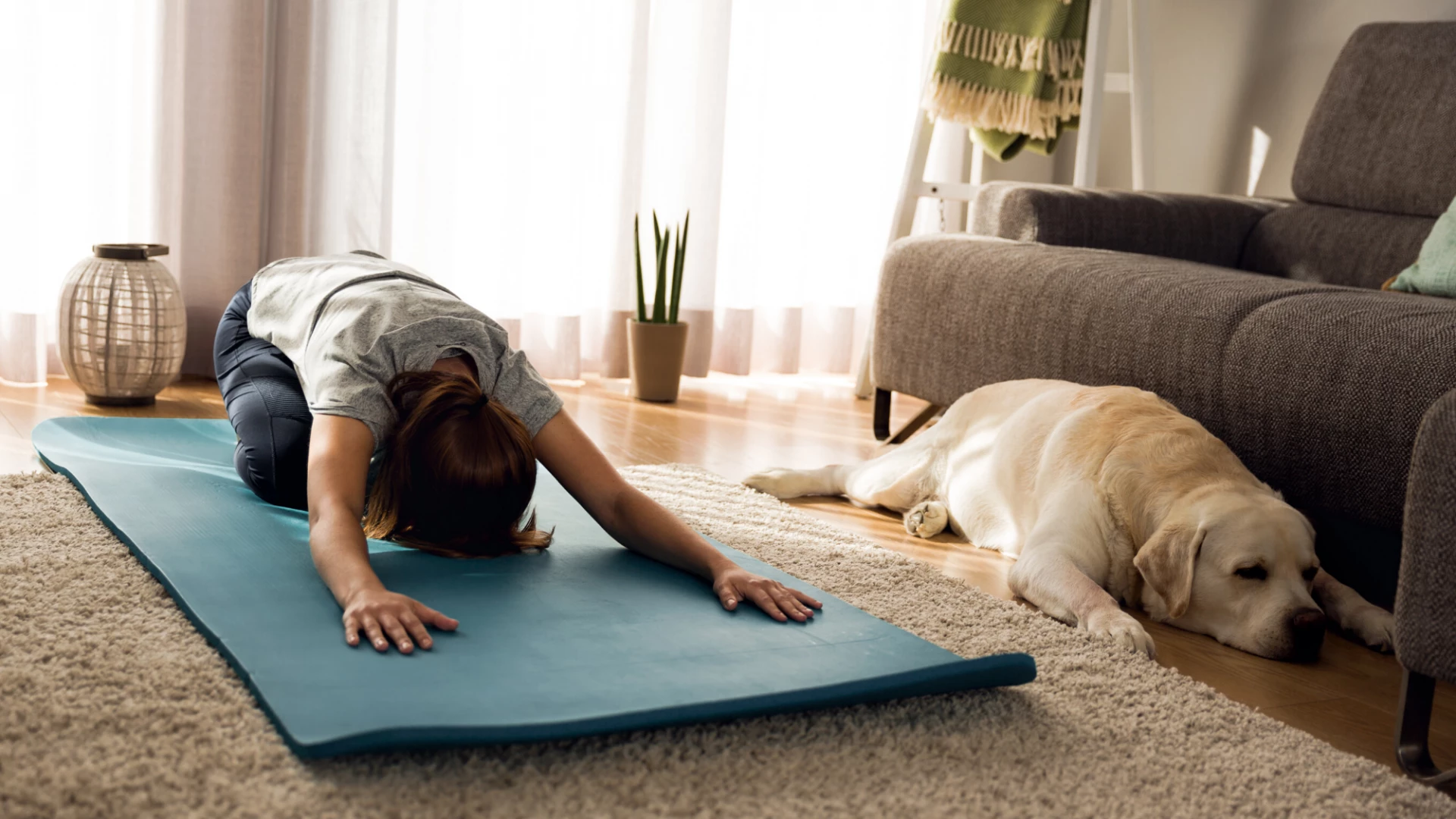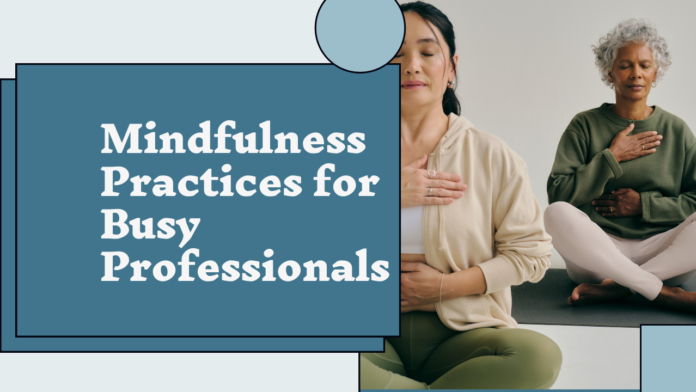Last Updated on April 5, 2024 by Silvy
Mindfulness Practices for Busy Professionals: Find Calm in the Chaos (2024)
Do you ever feel like you’re constantly running on a hamster wheel, perpetually chasing deadlines and to-do lists? If you’re a busy professional, the answer is probably a resounding yes.
In today’s fast-paced world, it’s easy to get caught up in the hustle and bustle of work, neglecting our well-being in the process. But what if there was a way to cultivate calm and focus amidst the chaos? Enter mindfulness.
Mindfulness is the practice of paying present-moment attention in a non-judgmental way. It’s about becoming aware of your thoughts, feelings, and bodily sensations without getting swept away by them.
For busy professionals, mindfulness offers a powerful toolkit for managing stress, improving focus, and boosting overall well-being.
This article will explore a range of mindfulness practices specifically tailored for busy professionals. We’ll delve into the benefits of mindfulness, provide easy-to-follow exercises you can integrate into your workday, and answer some of the most frequently asked questions about this transformative practice.
So, take a deep breath, put down that overflowing coffee mug, and get ready to discover how mindfulness can revolutionize your work life.
Why Mindfulness Matters for Busy Professionals
Being a busy professional often comes with a hefty price tag – stress, anxiety, and difficulty focusing. Chronic stress can wreak havoc on our physical and mental health, leading to burnout, decreased productivity, and impaired decision-making.
Mindfulness offers a powerful antidote to these challenges. Here’s how:
- Reduces stress: Mindfulness helps us become aware of our stress triggers and develop healthy coping mechanisms. By focusing on the present moment, we can detach from worries about the future or regrets about the past.
- Improves focus: In our fast-paced world, distractions abound. Mindfulness helps us cultivate laser-sharp focus by training our attention to stay present on the task at hand.
- Boosts emotional intelligence: Mindfulness allows us to observe our emotions without judgment. This heightened awareness enables us to respond to situations calmly and effectively.
- Enhances creativity: When our minds are constantly bombarded with worries, it stifles creativity. Mindfulness creates space for new ideas to emerge by quieting the mental chatter.
- Increases productivity: By improving focus and reducing stress, mindfulness empowers us to work smarter, not harder. We become more efficient and effective in tackling our tasks.

Mindfulness Made Simple: Easy Practices for the Busy Bee
The beauty of mindfulness is its simplicity. You don’t need hours of meditation or a complete lifestyle overhaul to reap the benefits. Here are some easy-to-integrate practices you can incorporate into your busy schedule:
1-Minute Relaxation Techniques
- Mindful Breathing: Take a few minutes throughout your day to simply focus on your breath. Feel your belly rise and fall with each inhalation and exhalation. If your mind wanders, gently guide your attention back to your breath.
- Body Scan Meditation: Close your eyes and take a few deep breaths. Begin by focusing on your toes, noticing any sensations you feel. Slowly work your way up your body, acknowledging sensations without judgment.
Short Mindfulness Breaks Throughout the Day
- Mindful Walking: Take a mindful walk during your lunch break. Notice the sensations in your feet as you walk, the sights around you, and the sounds you hear.
- Mindful Eating: Slow down during meals. Savor each bite, noticing the taste, texture, and aroma of your food.
Integrating Mindfulness into Your Work Routine
- Mindful Meetings: Before a meeting, take a few minutes to center yourself. Set an intention for the meeting and focus on actively listening to others.
- Mindful Emailing: Avoid checking emails first thing in the morning. Schedule specific times to check and respond to emails throughout the day. When reading an email, take a moment to gather your thoughts before responding.

Deepen Your Practice: Resources for Busy Professionals
As you become more comfortable with mindfulness, you can explore a wider range of practices. Here are some resources to help you deepen your practice:
- Mindfulness Apps: Several mindfulness apps offer guided meditations, breathing exercises, and other resources for beginners and experienced practitioners alike.
- Mindfulness Courses: Online and in-person mindfulness courses can provide a structured learning environment and support from a qualified instructor.
- Mindfulness Books: Numerous excellent books on mindfulness offer practical guidance and insights.
Conclusion
Mindfulness isn’t about achieving a state of perfect zen.It’s about cultivating a more present and aware way of being. By incorporating these simple practices into your daily routine, you can begin to experience the transformative power of mindfulness.
You’ll find yourself feeling calmer, more focused, and better equipped to handle the inevitable challenges of professional life.
Remember, mindfulness is a journey, not a destination. Be patient with yourself, celebrate your progress, and enjoy the process of creating a more mindful and fulfilling work life.
Frequently Asked Questions (FAQs) About Mindfulness
I don’t have time to meditate! Can mindfulness still benefit me?
Absolutely! Even short bursts of mindfulness throughout the day can make a big difference. Try incorporating some of the 1-minute relaxation techniques or short mindfulness breaks mentioned earlier. Every little bit counts!
Will mindfulness make me less productive?
On the contrary, mindfulness can actually boost your productivity. By improving focus and reducing stress, you’ll be able to work smarter, not harder. You’ll find yourself accomplishing more in less time.
I’m worried mindfulness is for hippies and yogis. Is it right for me?
Mindfulness is a secular practice that can benefit anyone, regardless of background or beliefs. In fact, mindfulness has been embraced by leading corporations and organizations worldwide as a way to enhance employee well-being and performance.
What if my mind keeps wandering during meditation?
Don’t worry, that’s perfectly normal! The key is to gently guide your attention back to your breath or whatever focus point you’ve chosen. With practice, it becomes easier to maintain focus.
Are there any mindfulness exercises I can do at my desk?
Certainly! Try mindful journaling, where you take a few minutes to write down your thoughts and feelings without judgment. You can also do some simple stretches or neck rolls to bring awareness to your body.
Verified Source References:
- Mindfulness for Beginners: Mayo Clinic: https://www.mayoclinichealthsystem.org/hometown-health/speaking-of-health/use-mindfulness-to-improve-well-being
- How Mindfulness Reduces Stress: Harvard Health Publishing: https://www.harvard.edu/in-focus/mindfulness-meditation/
- Mindfulness in the Workplace: Mindful: https://work.mindful.org/


